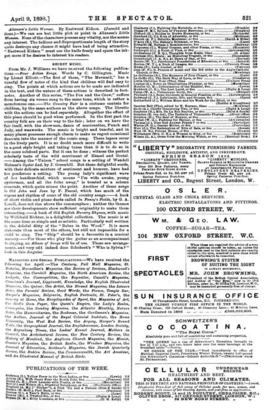RECENT MUSIC.
From Mr. J. Williams we have received the following publica- tions :—Four Action Songs. Words by C. Gillington. Music by Lionel Elliott —The first of these, "The Mermaid," has a tuneful flow of notes of the kind that children will find easy to sing. The points at which actions are to be made are indicated in the text, and the nature of these actions is described in foot- notes. Another of this series, "The Fox and the Crow," suffers from having six verses sung to the same tune, which is rather a monotonous one.—The Country Fair is a costume cantata for .children, by the same authors as the above songs. The libretto with the actions can be had separately. Altogether the effect of this piece should be good when performed. In the first part the country folk are on their way to the fair ; later on we have the fair itself, with the showmen, dance of marionettes, Punch and Judy, and waxworks. The music is bright and tuneful, and in many places possesses enough charm to make us regret occasional descents into the manner of the comic song. These lapses occur in the lively parts. It is no doubt much more difficult to write in a good style bright and taking tunes than it is to do so in the more subdued parts. But it can be done ; witness the perfect scholarly taste of the wild merriment of Hansel and Gretel. —Among the "Unison" school songs is a setting of Wendell Holmes's Oyster Lad, by J. Greenhill. But these delightful words, with their delicate mixture of sentiment and humour, have had too ponderous a setting. The young lady's significant wave of her handkerchief, which means "I'm wide awake, young oysterman, and all the folks away," is treated as a solemn -crescendo, which quite misses the point. Another of these songs is Old John and Joan by F. Pascal, which has much of the 'vigour and rhythm of some of the old country songs.—A book -of short violin and piano duets called In Fancy's Fields, by G. A. Lovell, does not rise above the commonplace ; neither the themes nor their developments show sufficient originality to make them interesting.—A book of 0/ci English Nursery Rhymes, with music by Withheld Richter, is a delightful collection. The music is at the same time so simple and so artistic. Particularly well written is the doleful ditty of the "Babes in the Wood." It is more -elaborate than most of the others, but still not impossible for a child to sing. The " Ship " should be a favourite in a musical nursery.—For those who play the guitar as an accompaniment to singing, an Album of Songs will be of use. These are arrange- ments, and very odd indeed does Schubert's "Who is Sylvia ? " (look in this disguise.


































 Previous page
Previous page